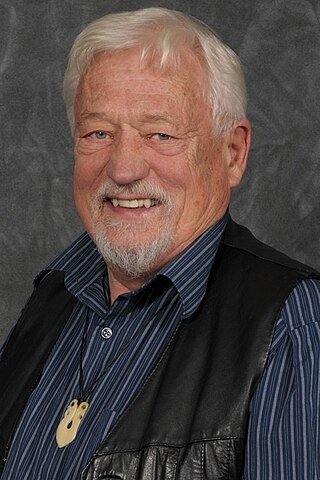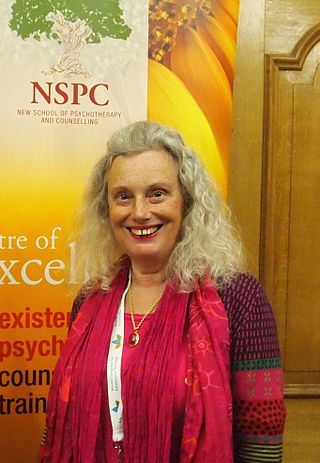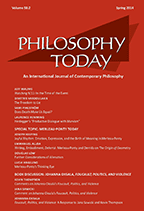The World Phenomenology Institute (WPI, originally named the World Institute for Advanced Phenomenological Research and Learning) is an academic organization founded in 1976 to promote scholarship in the area of phenomenology. The organisation was founded by Anna-Teresa Tymieniecka.

Existentialism is a form of philosophical inquiry that explores the issue of human existence. Existentialist philosophers explore questions related to the meaning, purpose, and value of human existence. Common concepts in existentialist thought include existential crisis, dread, and anxiety in the face of an absurd world, as well as authenticity, courage, and virtue.

Maurice Jean Jacques Merleau-Ponty was a French phenomenological philosopher, strongly influenced by Edmund Husserl and Martin Heidegger. The constitution of meaning in human experience was his main interest and he wrote on perception, art, politics, religion, biology, psychology, psychoanalysis, language, nature, and history. He was the lead editor of Les Temps modernes, the leftist magazine he established with Jean-Paul Sartre and Simone de Beauvoir in 1945.
Phenomenology is the philosophical study of the structures of experience and consciousness. As a philosophical movement it was founded in the early years of the 20th century by Edmund Husserl and was later expanded upon by a circle of his followers at the universities of Göttingen and Munich in Germany. It then spread to France, the United States, and elsewhere, often in contexts far removed from Husserl's early work.

Continental philosophy is a term used to describe some philosophers and philosophical traditions that do not fall under the umbrella of analytic philosophy. However, there is no academic consensus on the definition of continental philosophy. Prior to the twentieth century, the term "continental" was used broadly to refer to philosophy from continental Europe. A different use of the term originated among English-speaking philosophers in the second half of the 20th century, who used it to refer to a range of thinkers and traditions outside the analytic movement. Continental philosophy includes German idealism, phenomenology, existentialism, hermeneutics, structuralism, post-structuralism, deconstruction, French feminism, psychoanalytic theory, and the critical theory of the Frankfurt School as well as branches of Freudian, Hegelian and Western Marxist views.

Gabriel Honoré Marcel was a French philosopher, playwright, music critic and leading Christian existentialist. The author of over a dozen books and at least thirty plays, Marcel's work focused on the modern individual's struggle in a technologically dehumanizing society. Though often regarded as the first French existentialist, he dissociated himself from figures such as Jean-Paul Sartre, preferring the term philosophy of existence or neo-Socrateanism to define his own thought. The Mystery of Being is a well-known two-volume work authored by Marcel.

Contemporary philosophy is the present period in the history of Western philosophy beginning at the early 20th century with the increasing professionalization of the discipline and the rise of analytic and continental philosophy.
Existential phenomenology encompasses a wide range of thinkers who take up the view that philosophy must begin from experience like phenomenology, but argues for the temporality of personal existence as the framework for analysis of the human condition.
Existential psychotherapy is a form of psychotherapy based on the model of human nature and experience developed by the existential tradition of European philosophy. It focuses on concepts that are universally applicable to human existence including death, freedom, responsibility, and the meaning of life. Instead of regarding human experiences such as anxiety, alienation, and depression as implying the presence of mental illness, existential psychotherapy sees these experiences as natural stages in a normal process of human development and maturation. In facilitating this process of development and maturation, existential psychotherapy involves a philosophical exploration of an individual's experiences stressing the individual's freedom and responsibility to facilitate a higher degree of meaning and well-being in their life.

Don Ihde is an American philosopher of science and technology. In 1979 he wrote what is often identified as the first North American work on philosophy of technology, Technics and Praxis.
Phenomenology may refer to:

Emmy van Deurzen is an existential therapist. She developed a philosophical therapy based in existential-phenomenology.

Northwestern University Press is an American publishing house affiliated with Northwestern University in Evanston, Illinois. It publishes 70 new titles each year in the areas of continental philosophy, poetry, Slavic and German literary criticism, Chicago regional studies, African American intellectual history, theater and performance studies, and fiction. Parneshia Jones is director of the press. It is a member of the Association of University Presses.

Phenomenology within sociology, or phenomenological sociology, examines the concept of social reality as a product of intersubjectivity. Phenomenology analyses social reality to explain the formation and nature of social institutions. The application of phenomenological ideas in sociology is distinct from other social science applications of social science applications.

Lebensphilosophie was a dominant philosophical movement of German-speaking countries in the late 19th and early 20th centuries, which had developed out of German Romanticism. Lebensphilosophie emphasised the meaning, value and purpose of life as the foremost focus of philosophy.
Anna-Teresa Tymieniecka was a Polish philosopher, phenomenologist, founder and president of The World Phenomenology Institute, and editor of the book series, Analecta Husserliana. She had a thirty-year friendship and occasional academic collaboration with Pope John Paul II.
This is a list of articles in continental philosophy.
The Society for Phenomenology and Existential Philosophy (SPEP) is a philosophical society whose initial purpose was to promote the study of phenomenology and existentialism but has since expanded to a wide array of contemporary philosophical pursuits, including critical theory, feminist philosophy, poststructuralism, critical race theory, and increasingly non-Eurocentric philosophies. SPEP was created in 1962 by American philosophers who were interested in Continental philosophy and were dissatisfied with the analytic dominance of the American Philosophical Association. It has since emerged as the second most important philosophical society in the United States. Alan D. Schrift and Shannon Sullivan are the current Executive Co-Directors of SPEP.

Philosophy Today is an international peer-reviewed journal that reflects the current questions, topics and debates of contemporary philosophy, with a particular focus on continental philosophy.

Yvanka B. Raynova is a Bulgarian philosopher, feminist, editor, translator, and publisher. She is full professor of contemporary philosophy at the Institute of Philosophy and Sociology at the Bulgarian Academy of Sciences and director of the Institute for Axiological Research in Vienna. She elaborated a post-personalist hermeneutic phenomenology based on some gnostic ideas. Her works include studies on continental philosophy, phenomenology, hermeneutics, axiology, feminist philosophy, intercultural philosophy, religious studies, and translation studies.

The British Society for Phenomenology (BSP) is an organization whose purpose is to pursue and exchange philosophical ideas inspired by phenomenology. It was established in 1967 by Wolfe Mays. The society accomplishes its aims through a journal, an annual conference (as well as other events), and a podcast.